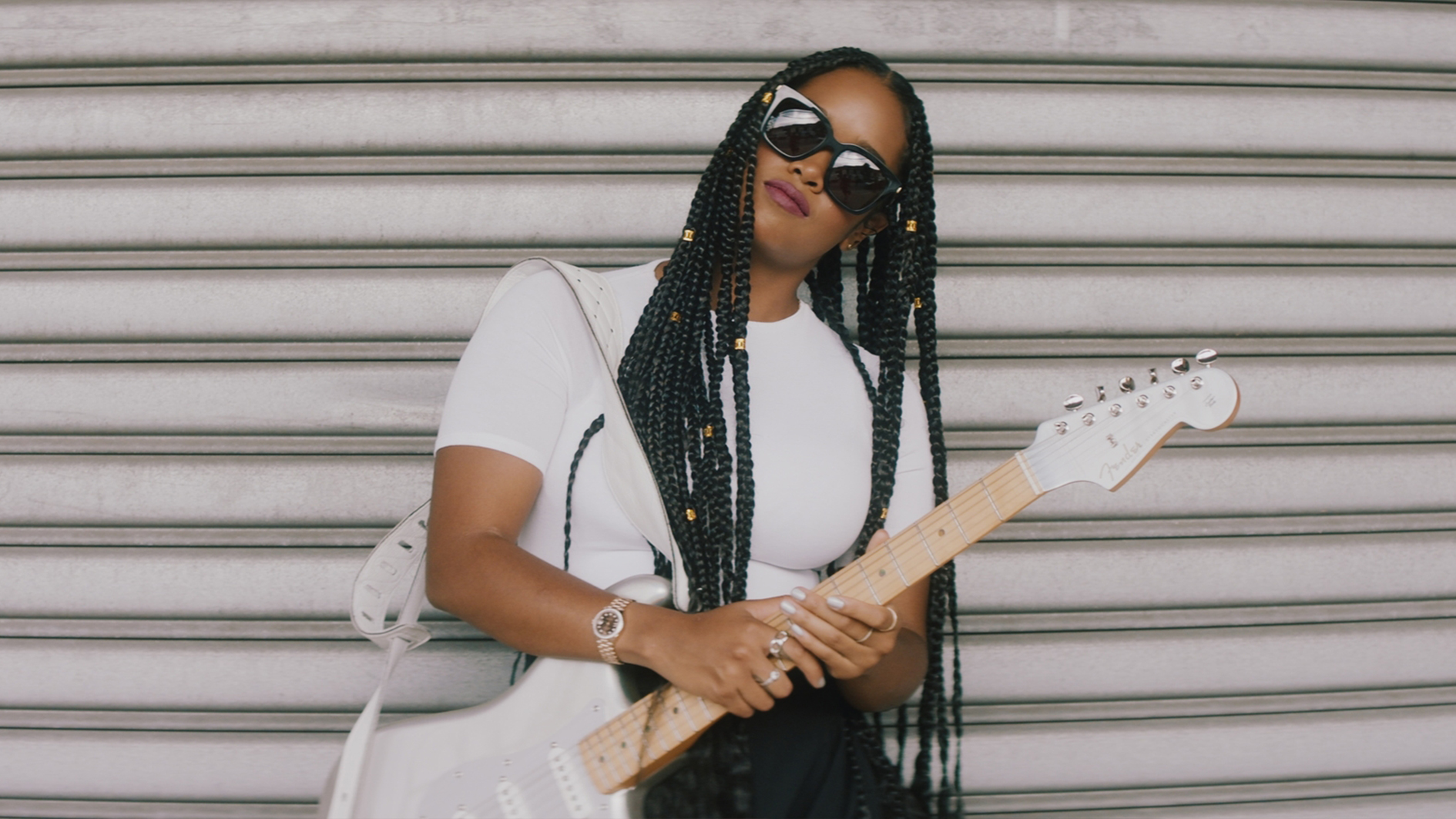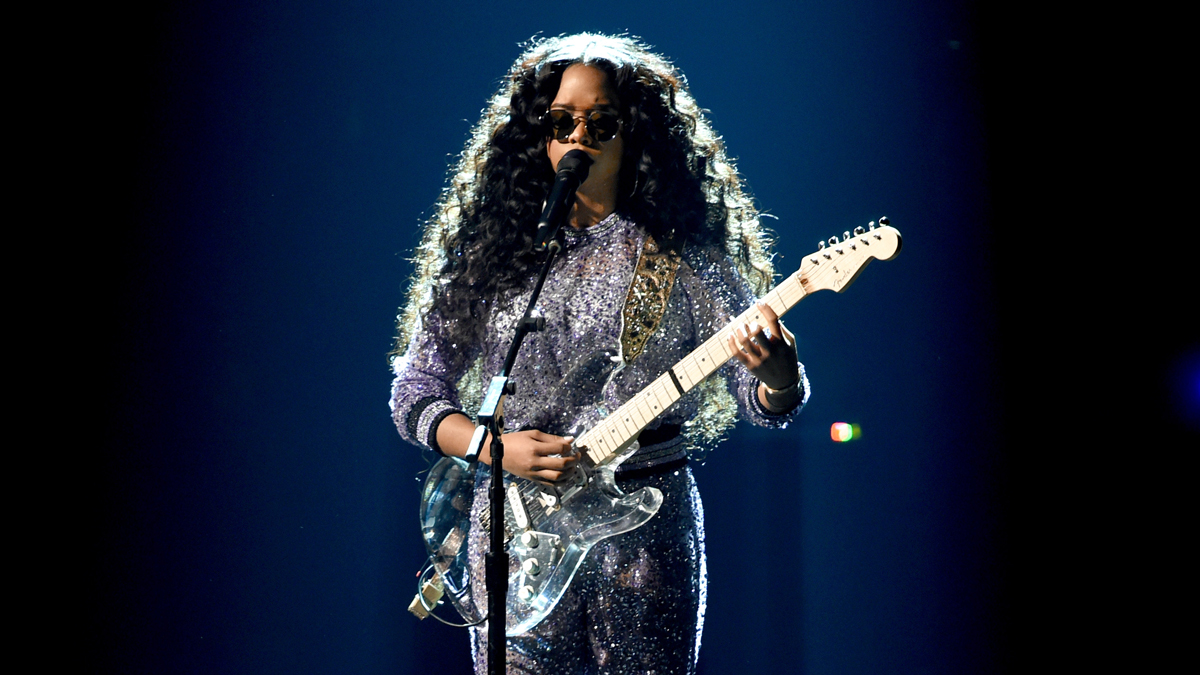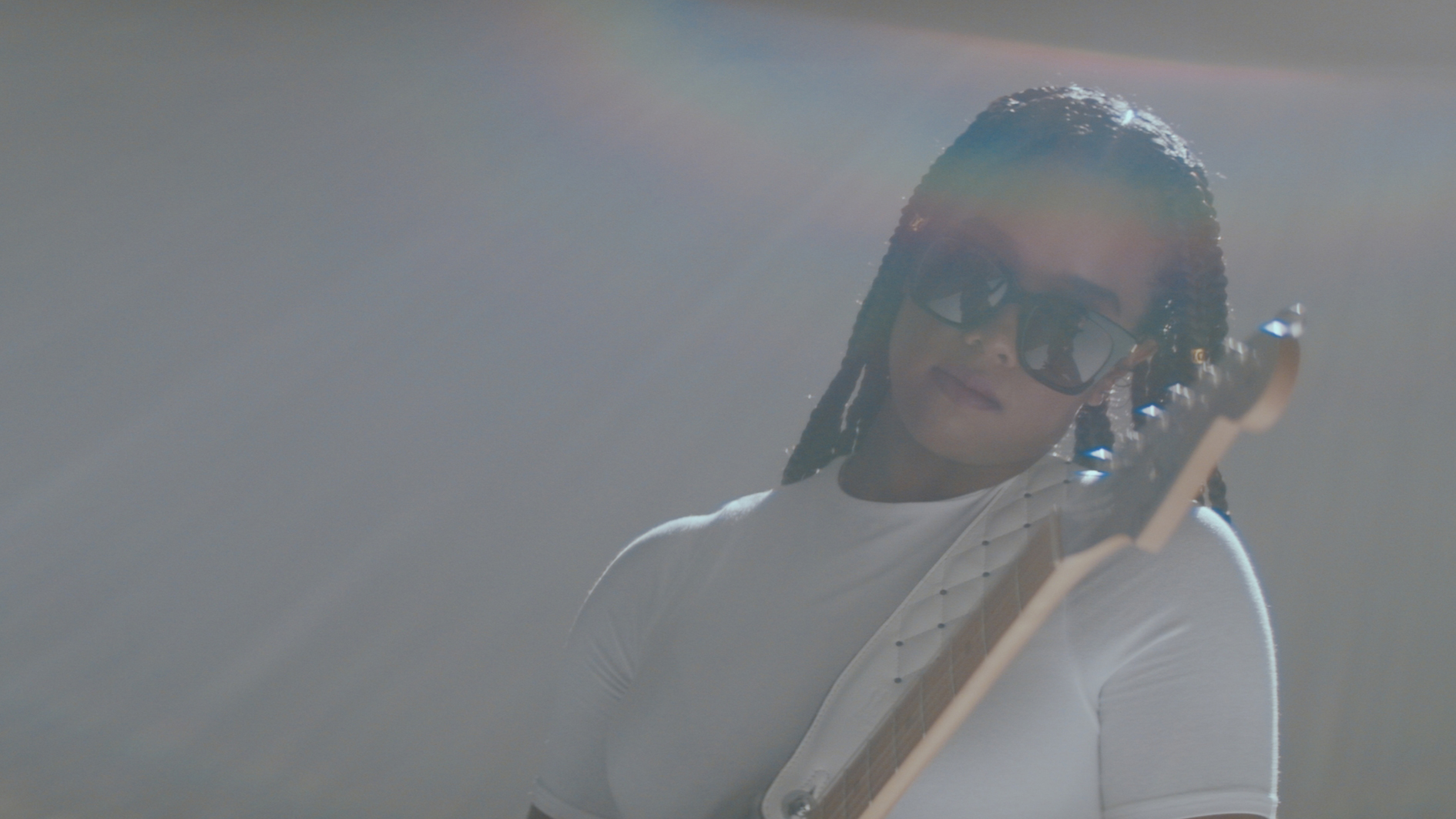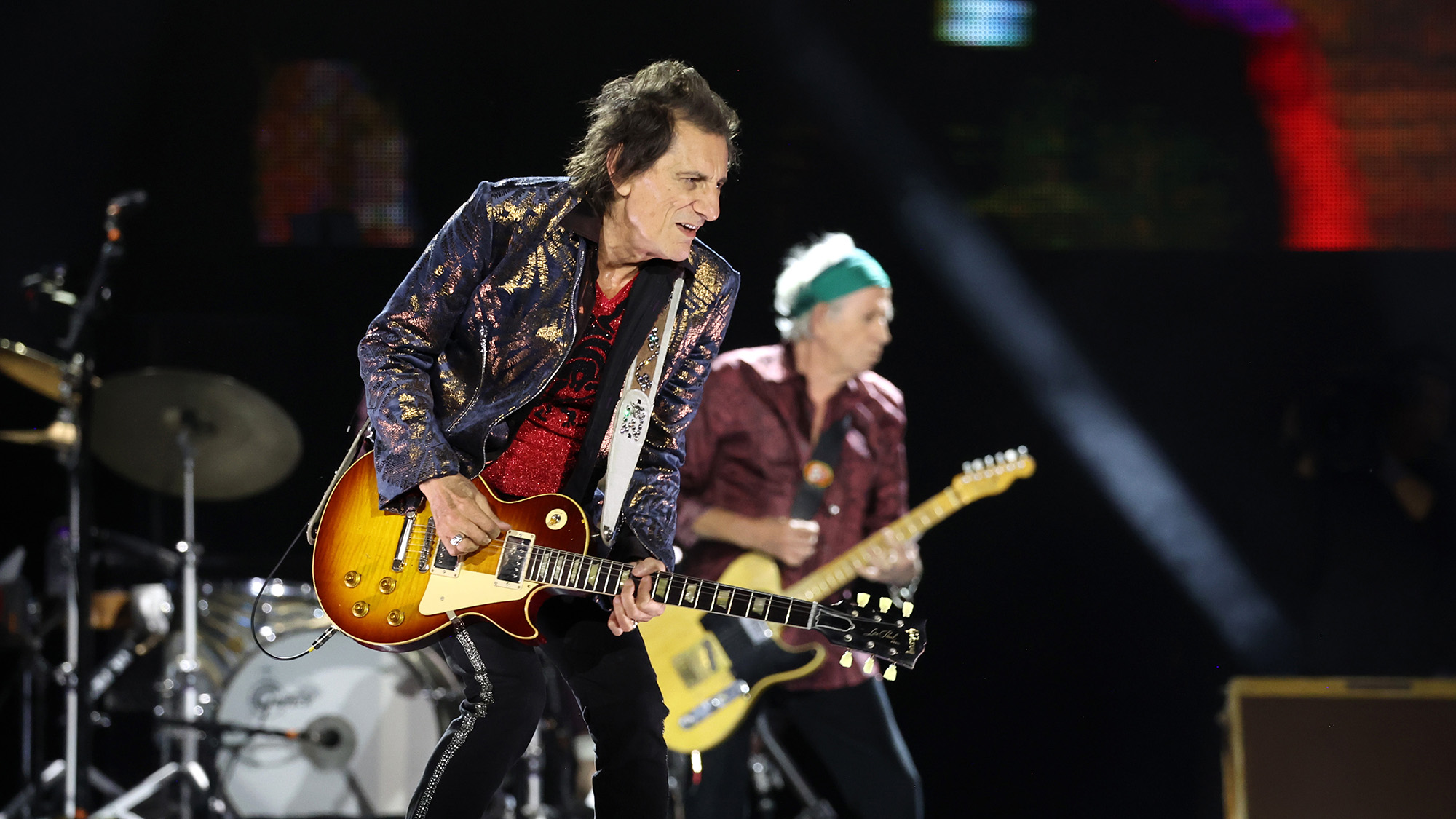H.E.R.: "I play melodies that feel closer to what a singer would do, as opposed to a guitar player"
The Grammy-winning RnB singer-songwriter on feel over theory, the enduring genius of Jimi Hendrix and the creation of her stunning new signature Fender Stratocaster

“It still doesn’t feel real, to be honest!” beams American singer/songwriter H.E.R. when Guitar World asks what it means to be joining the select list of players with their own Fender model.
Having signed a major record deal in her very early teens, with two solo albums and numerous EPs out so far - and having accumulated two Grammys and 10 nominations by her early 20s - the new signature cements her stature as one of the most exciting players in modern RnB.
It will come in a Chrome Glow finish and feature a mid-‘60s C-shape maple neck, Fender’s own Vintage Noiseless pickups and an anodized aluminum pickguard...
"The coolest thing about it all is being the first black woman to have her own signature guitar with Fender,” she continues. “I think it will inspire a lot of young black girls - and actually a lot of young girls in general - to pick up the guitar, which is something we don’t see enough of.
"I used to walk into Guitar Center and pick out a pink bass or something I might have seen another female artist play. That’s the key thing for me, just to inspire, so I can’t wait to see this thing I created in the stores and in the hands of people who love my music!"
We have to say - that is one hell of a finish you chose there...
"Thank you! I’ve never seen anything like it and that’s totally on purpose. I wanted to do something super unique and super ‘me’. The reason I did is exactly for the reaction you just said. The noiseless pickups were also a definite must-have for me.
All the latest guitar news, interviews, lessons, reviews, deals and more, direct to your inbox!
"I wanted the color of the neck and the size of the neck to be a certain way, it had to match perfectly with the iridescent color and feel easy to move around on."
That clear Strat you played at the Grammys also turned a few heads!
"It’s one of my favorite guitars! It’s better to look at sometimes, because it’s pretty hard to stand up with. It’s not wood, it’s acrylic, which is super heavy and harder to use for a long time. They actually made that guitar for me in five days and it matches every single one of my outfits.
"The crazy thing is people always want to touch it and want to know what it feels like, and so when we were making this signature, I wanted to create something similar that people really wanted to touch, feel and see in different lights.
"It’s the H.E.R. guitar, so needed to have the patterns, colors and tones I love."

The solo on the song you performed, Hard Place, made use of some really tasteful major pentatonic lines…
"Well, that song was very acoustic and Nashville to start out with. When I had the opportunity to do a song at the Grammys, me and my team were actually discussing other songs. But I realized Hard Place was the one because I knew I could throw in elements you don’t hear on the record… or maybe you do but not as much.
"I could bring different things out with the live band, so there were elements of RnB, pop, country and rock.
"Starting more like a singer-songwriter kind of thing in the beginning, then a choir in the background to make the chorus extra big, followed by the drums coming in on the second verse. And I also knew I had to do a solo, even though I’d never done an electric version of the song at that point.
"It had to be melodic and bluesy, with a real turning point in how it ends with the big hook. I was really thinking about the whole arrangement and what exactly I was trying to achieve on the Grammy stage… because, honestly, that’s what it was written for. It was a bit like making a movie!"
Which other Fender signature models have impressed you most over the years?
I only do the things I’m passionate about, so every collaboration has felt unique and amazing
"There are so many artists who have come out with some dope stuff. There was a Sting bass that I thought was really incredible. I think that was possibly the one I loved most. I actually performed with him once in London at the Royal Albert Hall, which was amazing. He was awesome to work with. I’m a huge Buddy Guy fan, so of course I love his model.
"There was also a colorful Jimmy Page Tele that I really liked… I really love Teles. If we didn’t make a Strat for my signature, it would have had to have been a Tele."
You’ve collaborated with a lot of people - guests, producers and co-writers - in a very short space of time. Which do you feel most proud of?
"Everything I’ve done has felt different. I’ve done stuff that’s more reggae and RnB, other things that are more like a classic wedding song, other fun stuff. I recently played guitar on a Toni Braxton song, which felt really legendary. I’d never done anything like that before!
"I only do the things I’m passionate about, so every collaboration has felt unique and amazing. I love all these different styles of music.
"Having a good time and bonding with other musicians and creatives is always my favorite thing about what I do."

So who would your dream session be with?
"Man! I would love to play with Lenny Kravitz and do a song with him. I really love Stevie Wonder as well. I really like blending the worlds of rock and hip-hop, which is why doing a solo on A Boogie Wit Da Hoodie song felt so cool.
"I actually played with Aerosmith during the Grammys weekend one time, it was a MusiCares event. It was one of the coolest things I’ve ever done. Those guys are really old but they’re really cool. They’ve been touring for 50 years or something crazy like that [laughs]!"
Take us back to your earliest memories of music…
I met Carlos Santana when I was nine years old at a studio in the Bay Area. I was so blown away by the knowledge he had, though I can’t really remember much about what happened because I was so shocked
"I have so many. One of them was actually seeing Buddy Guy in concert with my Dad. We got to meet him and he signed a guitar strap that I still have. Seeing that black and white Strat made me want to get one, so later we went to Guitar Center and got a mini black and white beginner’s Strat.
"That’s how I learned how to play the blues and pentatonic scales, so it was the start of my guitar journey.
"Then I remember being a little bit older and my Dad cooking breakfast and putting on this moment with Prince and Lenny Kravitz on his concert DVD Raven To The Year 2000. Seeing them two together was huge, they were such rock stars that it made me want to be a rock star! We’d also watch Derek Trucks footage together. Anything we did in the house would have some music involved.
"I even met Carlos Santana when I was nine years old at a studio in the Bay Area, because it’s where I’m from and he lives around there. I was so blown away by the knowledge he had, though I can’t really remember much about what happened because I was so shocked."
It sounds like those kinds of bluesy tones are very much home for you…
"Definitely. Prince would always start on the bluesier side, he was very good at bringing out the feeling of a song. As was Ernie Isley, I really look up to him as well. Jimi Hendrix too, though he was very different.
"I always say Jimi Hendrix to guitar players was what Brandy was like for singers, because he was so innovative and now everyone does Jimi licks, and they probably don’t even realize those are his licks. He was a true pioneer, his note selection and random improvisations were a first. Who even was thinking of stuff like that back then?!
"Everything that I do is really based on the pentatonic scales. I grew up listening to B.B. King, Albert King and John Lee Hooker. I do like to get a bit melodic and do a little bit of fancy stuff that’s fast, but all the feeling I find is in the blues. I like the idea of making people feel something with just one note.
I’m a big fan of Fender Twins. I love the reverb and vibey tones they make, so they are probably my favorite amps
"I also like to play my guitar like I’m singing, so I go for melodies that might feel a bit closer to what a singer would do, as opposed to a guitar player. Sometimes, I like to sing and play my solos at the same time… even harmonizing my voice with my guitar."
What are your go-to’s when it comes to pedals and amps?
"I’m a big fan of Fender Twins. I love the reverb and vibey tones they make, so they are probably my favorite amps. I love Boss pedals - they’re what I started off with and I find myself going back to those ones more and more, especially for delay.
"I’ve been exploring a lot more recently, but I tend to keep it quite simple. It’s very time-consuming to get to know your pedals so you have to invest yourself in creating new sounds.
"I’m always back and forth between Boss delays, overdrives and chorus pedals. I guess the basic ones are my favorites! I’m currently testing out a wah my dad used to use all the time."

There are a lot of seventh chords and fingerstyle arpeggios in your music - what’s your take on the music theory aspect of playing?
"Honestly, I don’t really have much of a theory background. I’ve always played by ear, by feel. I feel like I’ve learned a lot more that way. My MD is a professor from the Berklee College Of Music in Boston.
"I guess playing by ear has been my thing… it’s all about what pops up into my head. I think that’s how you should lead, though I’m not saying you can’t use theory to help come up with something great… you absolutely can.
"But when I’m being creative, I hear chords in my head and try to translate on the guitar. I’ll feel something and realize it needs to be darker or brighter or more sad. I’m a mood person.
"That’s how you set the tone when it comes to making something more special or more sweet. You should think about how you want to set the mood in the room and how you want to make people feel through your instrument.
"Your voice is an instrument, so when you go to something like a piano or guitar, treat it how you’d want a singer to sing to you or how you’d want them to make you feel. It’s all about the real emotion. That’s what we should all aim to put into our playing.”
Amit has been writing for titles like Total Guitar, MusicRadar and Guitar World for over a decade and counts Richie Kotzen, Guthrie Govan and Jeff Beck among his primary influences as a guitar player. He's worked for magazines like Kerrang!, Metal Hammer, Classic Rock, Prog, Record Collector, Planet Rock, Rhythm and Bass Player, as well as newspapers like Metro and The Independent, interviewing everyone from Ozzy Osbourne and Lemmy to Slash and Jimmy Page, and once even traded solos with a member of Slayer on a track released internationally. As a session guitarist, he's played alongside members of Judas Priest and Uriah Heep in London ensemble Metalworks, as well as handled lead guitars for legends like Glen Matlock (Sex Pistols, The Faces) and Stu Hamm (Steve Vai, Joe Satriani, G3).

